The Black Coats: An Introduction
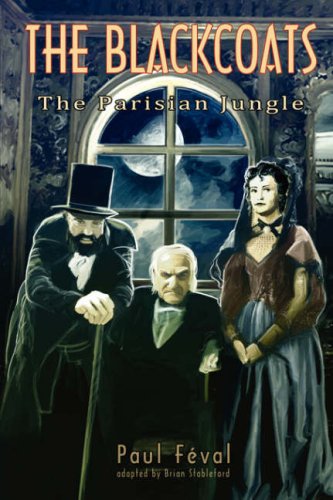
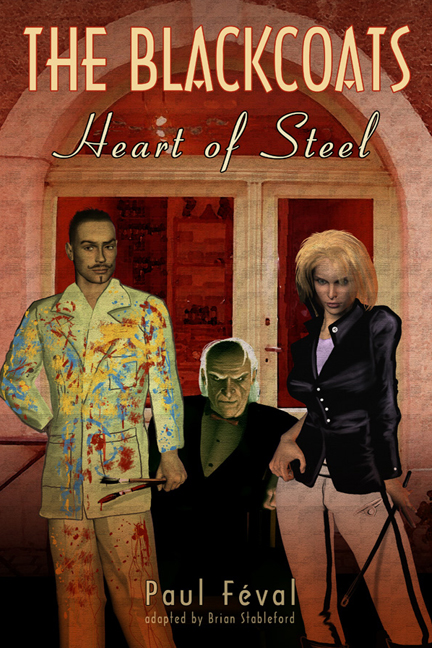 Les Habits Noirs is a series of seven landmark novels in pulp fiction history that have sadly been neglected outside of their native France. A fair degree of skepticism among modern readers is to be expected. Translations of obscure French novels can be a spotty affair and the verbose literary style of Victorian literature with its lengthy philosophical or historical passages are often wearying for a 21st Century audience. For every Fantomas that still captures modern imaginations, there are countless Dumas or Hugo pastiches whose only redeeming quality is their historical value to the avid student of fantastic fiction. Happily, Les Habits Noirs is one of those rare treasures that are as enthralling today as it was 140 years ago.
Les Habits Noirs is a series of seven landmark novels in pulp fiction history that have sadly been neglected outside of their native France. A fair degree of skepticism among modern readers is to be expected. Translations of obscure French novels can be a spotty affair and the verbose literary style of Victorian literature with its lengthy philosophical or historical passages are often wearying for a 21st Century audience. For every Fantomas that still captures modern imaginations, there are countless Dumas or Hugo pastiches whose only redeeming quality is their historical value to the avid student of fantastic fiction. Happily, Les Habits Noirs is one of those rare treasures that are as enthralling today as it was 140 years ago.
Paul Feval wrote all seven books in the series. He was an amazingly prolific author who turned out swashbucklers, vampire tales, crime fiction and religious works of vastly varying quality. Brian Stableford has spent much of the last decade translating his works into English for publication by Jean-Marc Lofficier’s Black Coat Press, a pulp specialty publisher who chose the English-language title for Les Habits Noirs for their imprint. Many critics have compared Les Habits Noirs to Mario Puzo’s Godfather series. My own best comparison would be to consider it the antecedent to Norbert Jacques’ Doctor Mabuse, the Gambler and especially the three films Fritz Lang made from that seminal work. Like Lang’s three masterpieces of crime, Les Habits Noirs bridges the gap between Pulp and Art.
The seven books in the series were published between 1863 and 1875 and concern members of a secret society headed by a crime family led by the patriarchal Colonel Bozzo-Corona. The first book, entitled Les Habits Noirs in France, was re-titled The Parisian Jungle by Black Coat Press for their English translation. The book introduces the criminal brotherhood, The Black Coats as a cross between the Mafia and the Illuminati. Modern readers weaned on Dan Brown’s intriguing if hopelessly hackneyed neo-pulp thrillers will marvel at what a true master of the conspiracy thriller sub-genre is capable of crafting. Colonel Bozzo-Corona is as beguiling a criminal mastermind as any in fiction. A feeble grandfather figure that can strike as quick as a cobra, Bozzo-Corona is always portrayed as displaying an uncommon brilliance. His fatal flaw is his borderline Messianic complex which promises to be his ultimate undoing.
Like his creation, Feval was possessed of a similar fatal flaw in his inability to maintain the high standard of quality that he demonstrated with this series. Too much of his non-series work was derivative and, after leaving his fiction works behind following a dramatic religious conversion, he doomed his reputation to be little more than a literary footnote. From that perspective, Black Coat Press and Brian Stableford’s work seems little short of evangelical in its mission to bring Les Habits Noirs to a wider audience who will appreciate this seminal work for its richness and mesmerizing tone.
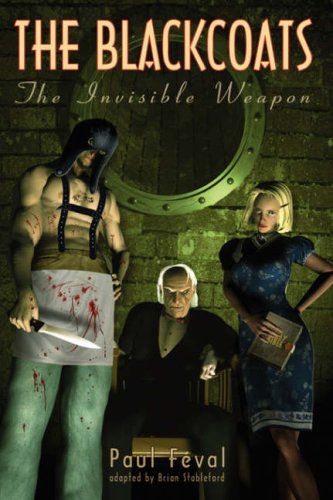
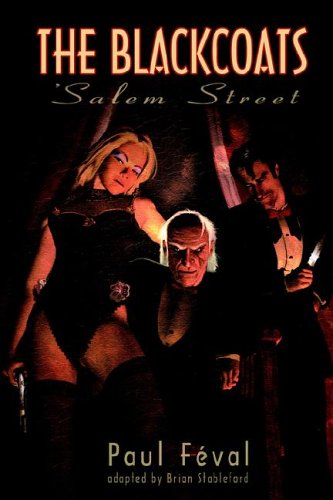 Each of the six sequels that have been freshly translated and annotated in amazing detail by Stableford upholds the same spellbinding quality as the original work. The seventh and final book of the series has just been published by Black Coat Press. The entire series is in print and available in English for the first time ever. The Parisian Jungle gave way to a companion volume, Heart of Steel (a literal translation of Feval’s 1865 novel, Coeur d’Acier). Rather than stick to a formula that would quickly grow repetitive as with most series, Feval opted to detail the exploits of another member of The Black Coats, the beautiful femme fatale, Marguerite of Clare. This companion volume to The Parisian Jungle is every bit as absorbing and deepens the reader’s knowledge and appreciation of Feval’s construct.
Each of the six sequels that have been freshly translated and annotated in amazing detail by Stableford upholds the same spellbinding quality as the original work. The seventh and final book of the series has just been published by Black Coat Press. The entire series is in print and available in English for the first time ever. The Parisian Jungle gave way to a companion volume, Heart of Steel (a literal translation of Feval’s 1865 novel, Coeur d’Acier). Rather than stick to a formula that would quickly grow repetitive as with most series, Feval opted to detail the exploits of another member of The Black Coats, the beautiful femme fatale, Marguerite of Clare. This companion volume to The Parisian Jungle is every bit as absorbing and deepens the reader’s knowledge and appreciation of Feval’s construct.
The third book in the series, The Sword Swallower (a literal translation of Feval’s L’Avaleur de Sabre) was published in 1867 and chronologically is the final entry in the series (and the last to be published by Black Coat Press). The book chronicles the exploits of the villainous Saladin who leads what is left of The Black Coats under the name The Black Silk Hoods. There is a hint of Feval’s own reform about the tale and modern readers would do well to read the series in chronological sequence rather than the order of publication for that very reason.
Feval’s fourth entry, Salem Street (derived from the original 1867 French title, La Rue de Jerusalem) is, in modern parlance, a prequel following on directly from the events of The Parisian Jungle and bringing Colonel Bozzo-Corona back to the fore. Marguerite of Clare is among the returning cast of characters in what may be the strongest book in a uniformly superb series. The introduction of a new protagonist for the series in the form of Pistolet is another mark in the book’s favor.
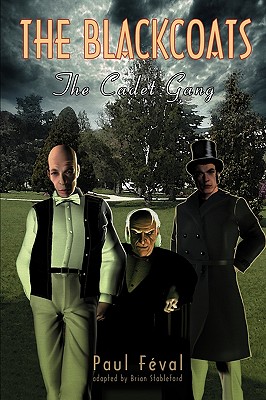
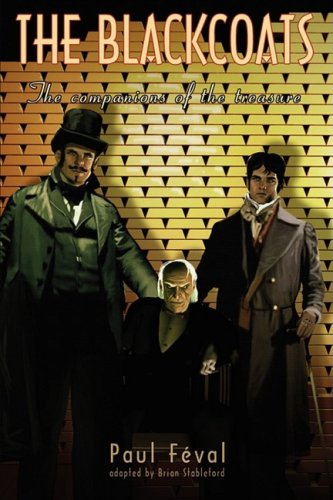 Feval continued with another direct sequel, The Invisible Weapon (translated from the original 1869 French title, L’Arme Invisible). Herein, Feval effectively combined the two existing strands of the series, the tragic romances, Heart of Steel and The Sword Swallower with the more thrilling conspiracy novels, The Parisian Jungle and Salem Street in detailing the life of the beautiful Fleurette who is caught between Good Girl and femme fatale in the Colonel’s games of deceit. It is in this title that Feval first develops the seeds of the Colonel’s destruction as the members of the High Council of The Black Coats plot his assassination in order to wrest control of the brotherhood from his grasp and to acquire the secret treasure that enables the Colonel to achieve so much with his seemingly limitless resources.
Feval continued with another direct sequel, The Invisible Weapon (translated from the original 1869 French title, L’Arme Invisible). Herein, Feval effectively combined the two existing strands of the series, the tragic romances, Heart of Steel and The Sword Swallower with the more thrilling conspiracy novels, The Parisian Jungle and Salem Street in detailing the life of the beautiful Fleurette who is caught between Good Girl and femme fatale in the Colonel’s games of deceit. It is in this title that Feval first develops the seeds of the Colonel’s destruction as the members of the High Council of The Black Coats plot his assassination in order to wrest control of the brotherhood from his grasp and to acquire the secret treasure that enables the Colonel to achieve so much with his seemingly limitless resources.
Feval’s penultimate novel in the series, The Companions of the Treasure (a literal translation of the original 1872 French title, Les Compagnons du Tresor) follows on directly from its predecessor in depicting the High Council’s determination to assassinate the Colonel. Interestingly, his decision to structure the series in non-linear fashion allowed Feval to revisit the scene of Colonel Bozzo-Corona’s death from the conclusion of The Parisian Jungle and expand upon the narrative to retroactively correct continuity errors from earlier books. Not quite as drastic as the wholesale ret-conning of series familiar to readers of comic books for the past thirty years, nonetheless Feval’s decision to exercise a creator’s prerogative and alter established continuity via careful expansion of the facts the reader was previously given is an inspired one. The fact that the revised text involves an impersonator is one that will bring a familiar smile to the faces of veteran comic and pulp readers who are now seeing the trick pulled off for perhaps the first time.
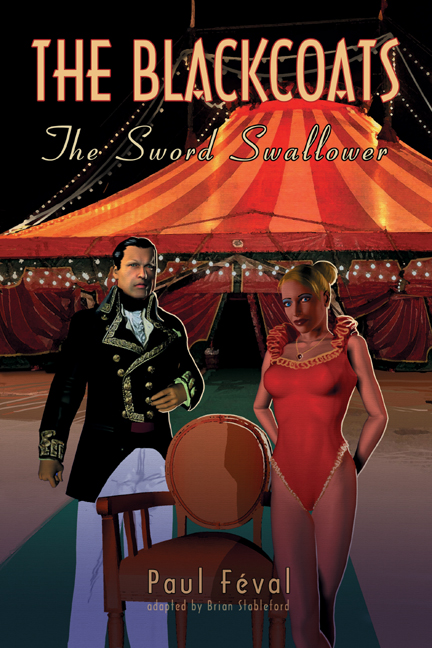 Feval’s seventh and final novel in the series, The Cadet Gang (translated from the original 1875 French title, La Bande Cadet) seeks to bridge the continuity between its immediate predecessor and The Sword Swallower. Feval sought to repeat his clever trick a second time by revising the conclusion of Heart of Steel and altering Marguerite of Clare’s fate. Unfortunately, a clever trick rarely works as well twice and it is certainly the case here where Feval isn’t nearly as cautious as he should have been resulting in a glaring plot hole that the author left unresolved following his religious conversion shortly after the book’s publication and his subsequent abandonment of this series and all of his other works of fantastic fiction.
Feval’s seventh and final novel in the series, The Cadet Gang (translated from the original 1875 French title, La Bande Cadet) seeks to bridge the continuity between its immediate predecessor and The Sword Swallower. Feval sought to repeat his clever trick a second time by revising the conclusion of Heart of Steel and altering Marguerite of Clare’s fate. Unfortunately, a clever trick rarely works as well twice and it is certainly the case here where Feval isn’t nearly as cautious as he should have been resulting in a glaring plot hole that the author left unresolved following his religious conversion shortly after the book’s publication and his subsequent abandonment of this series and all of his other works of fantastic fiction.
Happily, the ending Feval does give the series sees the Colonel (or perhaps an imposter) seemingly back from the dead and manipulating other people’s lives once more. While many readers may be irritated that Feval’s conversion robbed of us having all of the loose ends tied up, it is perhaps fitting that the series that introduced the conspiracy thriller to the world concludes with the greatest conspiracy of all. Paul Feval gave the world a lost treasure in Les Habits Noirs and Brian Stableford and Black Coat Press deserve the highest accolades for sharing this secret knowledge with the rest of us. Many readers of this article will be unfamiliar with The Black Coats. I urge you to pick up The Parisian Jungle or Salem Street today and discover for yourself that Paul Feval was capable of works of sheer genius and to his credit, he successfully maintained that quality over the course of seven novels completed over a dozen years. No student of thrillers, crime fiction, film noir, or pulp fiction can afford to ignore this seminal series that is every bit as potent today as it was two centuries ago.
William Patrick Maynard was authorized to continue Sax Rohmer’s Fu Manchu thrillers beginning with The Terror of Fu Manchu (2009; Black Coat Press). A sequel, The Destiny of Fu Manchu is due for publication in December 2011. Also forthcoming is a collection of short stories featuring an original Edwardian detective, The Occult Case Book of Shankar Hardwicke and an original hardboiled detective novel, Lawhead. To see additional articles by William, visit his blog at SetiSays.blogspot.com
Excellent article. I’ve heard about these books and seen them advertised, but never read anything that gave me a genuine sense of what they were, why they were good, and why someone as skilled as Brian Stableford would be so amazingly dedicated to bringing them to a wider audience.
Thanks.
Glad you enjoyed the article, John. I do highly recommend the series to anyone interested in pulp crime thrillers from Nikola to Fantomas to Mabuse. There is much to savor and Stableford did an excellent job translating and annotating the series. These really deserve far more attention than they have received. Hope you enjoy them.